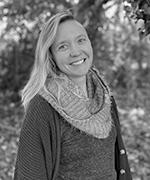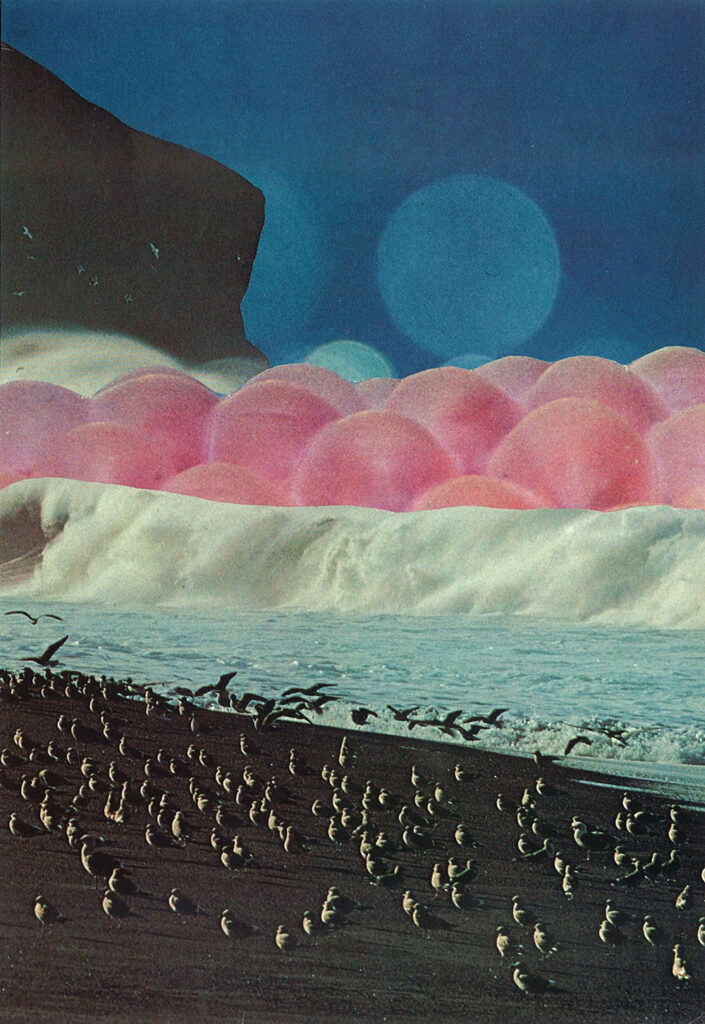By Caitlin Scarano
We begin in admiration and we end by organizing
our disappointment.
—Mary Ruefle
I’ve never met a man without demons. Not the priest with
his scourge, nor the sailor…
—Traci Brimhall
I wrote the bite of the moon. I wrote myself a trapdoor but first I had to make myself a floor.
I wonder, what was my father like as a boy? And then I realize that I never much wondered what he was like as a boy and I certainly never asked him this. I am as remote to him as a child as I like to believe I am to the child I was.
I suppose I could call him if the question is important enough. I would say, Look, sir, I can’t write about the moon without you.
The boy I sleep beside now has what every man has
in the black lake of him.
But oh, looking out over the water—
Last night, my boyfriend and I saw a heavy harvest moon. In what I could watch for a long time, his interest is often momentary. Not unappreciative, but his appetite for wonder and movement is sharpened and he scans the night sky for another pregnant moon (he always wants to have something to tell me about).
We have different philosophies on this. I believe if you are still somewhere long enough something will happen and then you follow the leaver’s urge—north, as far as you can go in your best coat.
Can I know so little about who my father is and was and not think this informs how I understand myself?
My mother, who never left, I know less and less. We shrink away from each other like light down a tunnel that lengthens and lengthens.
And I know about lengthening. I stretch my body so that I might identify and squeeze out its meanness.
This reminds me of a story my grandmother told us
about a boa constrictor that ate a baby
and they stretched out the snake and cut
the lump from the snake’s body
but the baby
was already dead.
At my boyfriend’s parents’ house the other day, a young warbler, the color of its feathers not yet fully changed, flew into the glass of the kitchen window and fell to the earth. His cousin rushed out and came back in, the warbler blinking in her cupped palms. His cousin and mother cooed over the bird, but I was immediately disinterested.
Faking interest in the baby bird reminded me of faking interest in my seven-month-old niece when I was home for Christmas last December. And my mother’s disgust.
I’m telling you this because, if you’ve implicated my father or mother, you are wrong.
It was my little sister’s baby, the wet niece that I held awkwardly while my mother cooked Christmas ham and pies, which brought my father back into the story.
I speak of his reentry, but it was in my little sister’s life; I didn’t see him. The last time I saw him is still a decade ago when he held the proofs of my senior photos, which he couldn’t see through his glaucoma, and told me how pretty I was.
I think my boyfriend’s father watches me like a snake in the grass, but not without some affection.
When my little sister told me she was pregnant
over the phone, I cried—helpless
remote sound, which she did not
acknowledge. I told her to give
the phone to our mother who hushed
us both and said, I know.
I know.
Does the boy in my bed know the myths his father made? Does he go behind his father collecting them like fallen leaves, careful of mouths coiled in the grass?
I don’t have to invent my father’s myths. Leaving creates a cathedral of myth. I will give this gift to a lover, a child.
The last time I wrote of the moon, I fell asleep with my mouth open I was so bored with myself.
When they knew she was pregnant, my little sister’s boyfriend called our father to tell him the news because no one else would. My little sister says she went into another room and closed the door so she would not hear them talking and laughing.
Apparently our father said, You think it’s hard being with her? You should try being married to their mother.
If I spoke to him I would tell him that much of his problem is that he never had the dignity to see himself and his family as more than the punch line of a barstool joke.
My little sister had the baby that June.
My father was all about the moon, singing the moon. Now I just imagine him distant and muffled like voices when you are under water.
Like my mother, did he distrust me even when I was small?
I don’t think so. This is why I have no anger to offer up to him. Only remote pity that rests close to indifference.
My mother left to run errands that December and, in the kitchen, the baby stared at me while I tried to ignore her.
How a body on top of another body could create her. How a body on top of another body can suffocate.
When she was a few months pregnant, my little sister’s boyfriend held a pillow over her face. Almost exactly a year later, she called me to say that our father’s sister had died but his mother, whom we’d all thought dead for a decade, was still alive.
I could make nothing
out of the death and the life.
I fell asleep with my mouth
open, my mouth
waiting for boys
in the sweetness of grass.

Caitlin Scarano is a writer based in Bellingham, Washington. She holds a PhD from the University of Wisconsin-Milwaukee and an MFA from the University of Alaska Fairbanks. Her second full length collection of poems, The Necessity of Wildfire, was selected by Ada Limón as the winner of the Wren Poetry Prize and recently won a 2022 Pacific Northwest Book Award. Her work has appeared in Granta, Carve, and Colorado Review. You can find her at caitlinscarano.com.

